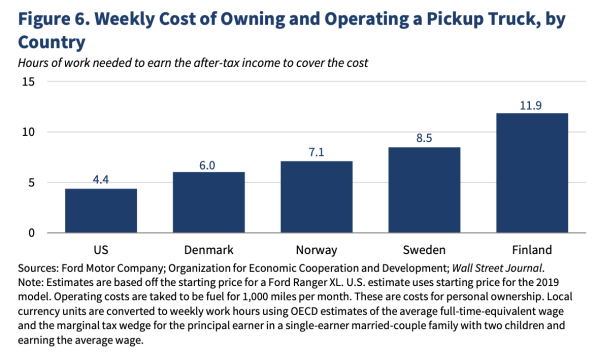Trump White House, lost in time warp, reports socialism is bad
Sometimes, somehow, it just gets funny. In the same week that the Trump administration says it will leave the Intermediate-Range Nuclear Forces Treaty with Russia, the White House Council of Economic Affairs (CEA) lets loose with a new report called, “The Opportunity Costs of Socialism.”
Not only does the Trump administration have us hurtling back into the dark days of the Cold War, but it shows that it’s co-opted a once-respected government institution, here the normally careful and studious CEA, for use as an awkward political mouthpiece.
Vox takes a good stab at explaining why a research report declaring the impotence of socialism and the vigor and rightness of capitalism would issue from the White House in 2018. It has something to do with the threat of socialized medicine. Suffice it to consider these priceless excerpts, which sound like they were written by a fading John Birch Society egghead pining for the good old days.
On page one, the CEA economists state: “We find that historical proponents of socialist policies and those in the contemporary United States share some of their visions and intents.” The CEA report draws some shaky parallels between the socialist authoritarians of old (Lenin, Mao, and Stalin) and the democratic socialists of today (Bernie Sanders and Elizabeth Warren), like this:
The Chinese leader Mao Zedong, who cited Marxism as the model for his country, described “the ruthless economic exploitation and political oppression of the peasants by the landlord class” (Cotterell 2011, chap. 6). Expressing similar concerns, current American senators Bernie Sanders and Elizabeth Warren have stated that “large corporations . . . exploit human misery and insecurity, and turn them into huge profits” and “giant corporations . . . exploit workers just to boost their own profits.”
See? They all use that “exploit” word. Twenty-first century single-payer healthcare, then, must have something in common with the starvation of the Great Leap Forward and the bloodshed of the Stalinist Purges, right?
“The socialist narrative names the oppressors of the vulnerable, such as the bourgeoisie (Marx), kulaks (Lenin), landlords (Mao), and giant corporations (Sanders and Warren).”
The report even takes a shot at French economist Thomas Piketty, whose 2013 book Capital put a thorn in the side of many right-wingers by pretty much proving the dangers of the Achilles Heel of today’s capitalist systems: That is, their habit of continually cycling capital upward to the narrowest and wealthiest echelons of society.
Piketty (2014) concludes that the Soviet approach and other attempts to “abolish private ownership” should at least be admired for being “more logically consistent.
As Vox notes, the CEA report spends a good deal of time explaining why the socialist agrarian systems of 20th Century China and Russia didn’t work. A quick word search of the report, however, finds no usages of “1928,” “stock market crash,” or “Great Depression.”
So, um, a new @WhiteHouseCEA report ostensibly written to argue against Medicare for All uses… the success of Medicare (!) to argue against it. https://t.co/irnkIlNzbh pic.twitter.com/RhndXzAHzE
— Steve Goldstein (@MKTWgoldstein) October 23, 2018
The report eventually lifts itself out of the past and attempts to dispel the liberal admiration of modern socialist systems of the Nordic countries, which seem to work reasonably well. To prove our capitalist system works better, the report points out that GDP per capita is higher in the U.S. than in Denmark, Finland, Iceland, and Sweden. And to really drive the point home, the CEA economists show that it’s cheaper to own a pickup truck in Bismarck, North Dakota, than it is in Haugesund, Norway.

In a recent poll, Gallup found that the general view of “socialism” in the U.S. has evolved somewhat since 1949, when the polling firm last asked the American people about it. In 2018, the number of people who define socialism as government ownership of everything has dropped by half, down to 17%. Around 6% still view it as modified communism, and another 6% had, according to Gallup, “non-specific derogatory opinions” about the term.
Generally, however, Gallup documents a shift toward a “gentler, lighter” understanding of socialism. Around 23% of Americans now–an 11% increase from 1949–see socialism as a means toward greater equity among people, and 10% think it would bring about an increase in benefits like improved social services and universal healthcare.
Not surprisingly, another recent Gallup poll found that only 16% of Republicans have positive views of socialism, and they’re vastly more likely to understand it as government control of the means of production. On the other hand, 57% of Democrats say they now have a positive view of socialism.
(46)



